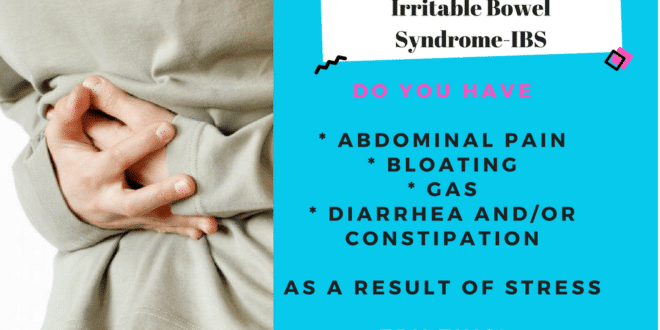What Is Irritable bowel syndrome-IBS?
Irritable bowel syndrome-IBS is a condition which presents with a range of symptoms, including:
* Abdominal pain
* Bloating
* Gas
* Diarrhea and constipation
Irritable bowel syndrome-IBS is not a structural issue, but instead, one commonly related to stress in a person’s life.
Irritable bowel syndrome-IBS is tricky, however, because it can be a “chicken or the egg” situation. Does stress cause Irritable bowel syndrome-IBS, or does Irritable bowel syndrome-IBS lead to stress? One thing we know is that around 60% of people who have IBS report high-stress levels. And approximately 60% of patients diagnosed with IBS have mental health issues, such as anxiety and depression. These people can benefit from various forms of therapy, such as talk therapy with a counselor.
Knowing what stress is, and tracking whether or not it changes your IBS symptoms, can be the first steps to a better life despite your condition.
Read more => What do you need to do to more efficiently deal with stress?
What causes irritable bowel syndrome-IBS?
It’s not known exactly what causes irritable bowel syndrome-IBS, but a variety of factors play a role. Lifestyle issues can play a big part, in particular, what you eat, and stress has also been shown to be a significant factor about IBS.
As the name suggests, the bowel (colon) is described as irritable; that is, sensitive. IBS can best be described as noticeable spasms of the colon which are so high that they can cause discomfort. It also generates a bloated feeling and gas. Also, it can cause diarrhea or constipation. What you eat can have a significant impact on your symptoms, and managing your stress levels can help as well.
Where Do the Spasms Come From?
The intense muscle spasms people experience with IBS are due to the walls of the intestines being lined with layers of muscle, which help propel feces through the colon and out of the body through the rectum and anus. The muscles contract and relax in what should be a coordinated rhythm.
If you have IBS, the contractions may be stronger and last longer than usual, causing gas, bloating and diarrhea if the stool is propelled too quickly through the colon. However, in the case of constipation, the opposite may occur, with weak contractions slowing the stool from passing, making it tough to have a bowel movement and leading to hard, dry stools.
There might also be something interfering with the signals between your brain and gut. This can interfere with the muscle contractions and cause you discomfort.
Other Factors which can trigger Irritable bowel syndrome-IBS
Around 60% of those with Irritable bowel syndrome-IBS have mental health issues such as anxiety and depression. A large number of people who suffer from stress also suffer from digestive disorders.
Women note that their Irritable bowel syndrome-IBS worsens during their menstrual periods, which are already associated with bloating and abdominal discomfort.
Foods which can trigger Irritable bowel syndrome-IBS
Food can trigger IBS in various ways, increasing the gas, bloating, diarrhea and constipation. Some foods can trigger gas, including:
* Chocolate
* Fatty food
* Fried food
* Dried fruit
* Beans
* Broccoli
* Cabbage
* Cauliflower
* Dairy products, including cheese
* Soda
* Alcohol
* Products with artificial sweeteners in them, such as sorbitol
* Items high in fructose (fruit sugar)
* Fruits that can be fermented, such as grapes and apples (and therefore, wine and apple cider)
Antibiotics and certain antidepressants can trigger Irritable bowel syndrome-IBS
Antibiotics and certain antidepressants can also affect the digestion. Antibiotics, in particular, can cause a significant imbalance in your gut flora, the bacteria that aid in digestion. Probiotics such as yogurt with active cultures can help restore the balance. Other foods to try include sauerkraut, kimchi (fermented Korean vegetables) and kefir, a fermented dairy beverage.
Other Illnesses which can trigger Irritable bowel syndrome-IBS
Other illnesses can affect colon health, including infectious diarrhea (gastroenteritis), or too many bacteria in the intestines; that is, bacterial overgrowth.
Any sudden changes in toilet habits that persist for more than a few days might be a sign of something more serious. Therefore, it is important to monitor your Irritable bowel syndrome-IBS and stress levels. A diary can help. Also, be proactive about your health by going to the doctor regularly. If there are any significant changes, see your doctor. They may refer you to a gastroenterologist. Depending on your age and symptoms, they might recommend a colonoscopy to check your bowel.
Therefore, any soothing foods you eat must also be ones that will not trigger any of these issues.
Stress-Relieving Food
* Salmon – Salmon is full of protein, vitamins, and minerals, in particular, omega-3 fatty acids, which reduce stress and inflammation and are good for heart health and overall health.
* Avocados – Avocadoes are a delicious fruit full of healthy fats that will also reduce inflammation and stress.
* Berries – Berries are high in nutrition and low in calories. They have a very thin skin, so are not likely to cause gastric upset the way other fruits with fibrous skin might. They are packed full of disease-fighting antioxidants. Your best choices include blueberries, blackberries, and strawberries.
* Oatmeal – An IBS diet is a bit tricky about fiber, but oatmeal is a healthy whole grain which also calms the nerves and lowers cholesterol naturally. Certified organic and gluten-free oatmeal is also a good substitute for wheat and rye since many people with IBS are sensitive to gluten (a certain type of protein).
* Walnuts and Almonds – These are both high in fiber, so they should be eaten in moderation. However, they are rich in healthy fats, which soothe stress. Studies have shown that as few as eight walnuts a day, or twelve almonds, can also naturally lower cholesterol by as much as 25%, leaving you at less risk of heart attack and stroke.
* Quinoa – Quinoa is a small seed rather than a grain. It is, therefore, gluten-free and lower in carbohydrates, which in turn lowers gas and bloating.
* Eggs – Eggs are packed with protein and amino acids, low in calories, and easily digested. Their full nutritional profile can offer excellent stress relief.
Read more
What Is A Stress Headache? Learn How to Treat It
Physical Signs and Symptoms of Stress
Natural Treatments of Stress Hives
I would love to connect with you!
You can find me on PINTEREST, FACEBOOK, TWITTER1, TWITER2, INSTAGRAM or GOOGLE+
Join my Pinterest group board here
Visit us on Pinterest









2 Comments
Timothy Alexander
My wife suffers from irritable bowel syndrome. But, after being diagnosed, she has not tried any types f treatment other than avoiding certain foods. I absolutely believe it was caused by an unhealthy lifestyle. Her diet is very high in sugar and fats. I have tried to get her to change her eating habits, but she just will not.
ekuzevska
She can try with stress relief techniques. The main trigger of IBS is stress. This may help her